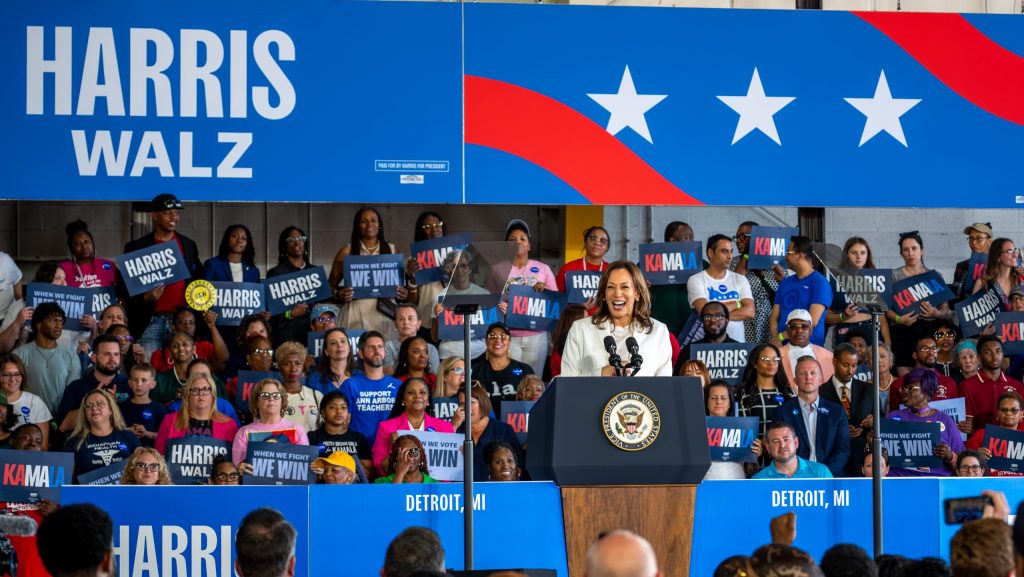Created Equal: Could Harris’ presidential bid be a watershed moment for women in politics?
Justina Giglio August 8, 2024Host Stephen Henderson was joined by three guests on Thursday to discuss Vice President Kamala Harris’ nomination and how it might affect the barriers women in politics still face today.

Vice President Kamala Harris addresses a crowd of union members and supporters at Detroit Metro Airport in Romulus on Wednesday, Aug. 7, 2024.
The Democratic Party has officially selected Vice President Kamala Harris as the party’s presidential nominee on Monday afternoon — marking the first time a woman of color has won a major party’s nomination, and only the second time a woman has been selected.
Of the 4,567 Democratic delegates who cast ballots, Harris — who just held a rally at Detroit Metro Airport on Wednesday — won the support of 99% of the voters. Though Harris appears to be succeeding in her rushed bid for the presidency, it’s important to note that there are significant barriers women face when running for an election.
Today on Created Equal, NBC News Correspondent Ali Vitali; political science professor Dr. Cathy Wineinger; and Kimberly Peeler-Allen, visiting practitioner at the Center for American Women and Politics at Rutgers University, joined the show to discuss Harris’ nomination and the state of women in politics.
Subscribe to Created Equal on Apple Podcasts, Spotify, Google Podcasts, NPR.org or wherever you get your podcasts.
Guests
Ali Vitali is a Capitol Hill correspondent for NBC News and the author of the book “Electable: Why America Hasn’t Put a Woman in the White House…Yet.” She says that Michigan’s women-dominated leadership will assist Harris’ campaign because Michiganders are used to voting for, and seeing, women win top government offices.
“Politically, Michigan is a battleground state. But from the perspective of gender and politics, you [have to] look up and down the upper echelons of leadership in Michigan,” Vitali said. “You have, of course, Gretchen Whitmer at the top of that, but then you have Jocelyn Benson and Dana Nessel. It’s important to look at the fact that Michigan voters are habituated to seeing women run for executive and top leadership roles, and they’re used to seeing them win.”
Dr. Cathy Wineinger is an associate professor in the Department of Political Science at Western Washington University in Bellingham, Washington. She says the biggest barrier to office is firstly getting women to run, and then making sure they run as themselves.
“I think getting women to decide to run in the first place is the biggest challenge to overcome. But I think we’re seeing that, and this change in the political landscape does send a signal to women [and] to women of color, that: ‘Hey, I can run and I can run as myself. I don’t need to fit into this [white man] stereotype,’’ Wineinger said. “And that’s especially true on the Democratic side of the aisle – I think it’s maybe not as true on the Republican side.”
Kimberly Peeler-Allen is a visiting practitioner at the Center for American Women and Politics at Rutgers University and was formerly the Senior Advisor to New York State Attorney General Letitia James’ reelection. She says the reason women of color experience harassment when seeking government positions is because of America’s history as a white, patriarchal society.
“The vice president and [her] campaign aren’t leaning into the diversity of her experience and her identity, but the Republicans are,” Peeler-Allen said. “We’re seeing the increase of violence, threats and harassment against women and people of color in elected office across the board. A lot of that is sparked because of, for lack of a better phrase, their ‘difference’ from what the norm has been.”
Listen to Created Equal with host Stephen Henderson weekdays from 9-10 a.m. ET on 101.9 WDET and streaming on-demand.
